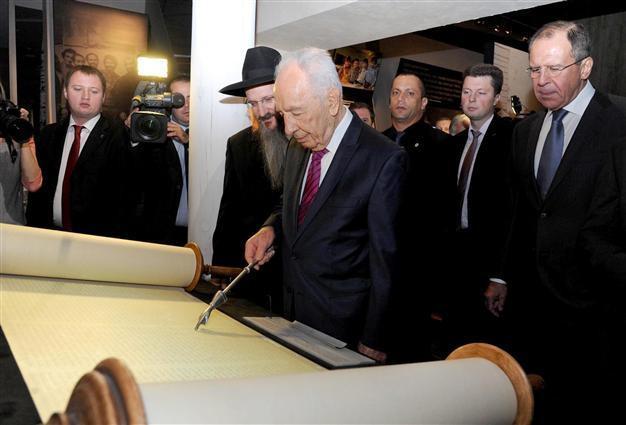Israel president opens new Jewish museum in Moscow
MOSCOW - Agence France-Presse

A handout photo made available by Israeli government press office GPO, showing Russian Foreign Minister Sergey Lavrov (R), Israeli President Shimon Peres (C) and chief rabbi of Russia Berl Lazar (C-L) attending the inauguration of the Jewish Museum of Tolerance in Moscow, 08 November 2012. EPA Photo
Israeli President Shimon Peres today opened one of the world's biggest Jewish museums housed in a converted Moscow bus garage which tells the story of Russian Jews from Tsarist times through the horror of the Holocaust.
Peres and Russian Foreign Minister Sergei Lavrov opened the Jewish Museum and Tolerance Centre which is based at Moscow's Bakhmetevsky Bus Garage, designed in 1926 by constructivist architect Konstantin Melnikov.
"There is no museum like this," Peres said at the opening ceremony attended by leading members of the Russian Jewish community including Chelsea football club owner Roman Abramovich and tycoon Viktor Vekselberg.
"This is great historical evidence of the greatness of man but also his weaknesses," said Peres, 89, who was born in what is now Belarus before his family settled in Palestine in the 1930s.
Peres recalled that both his parents had been born in the Russian Empire and everyone at home spoke "Yiddish, Hebrew and Russian", while his mother had sung him Russian songs.
"This is a very moving moment -- for my people, for my country and for me," he said.
The museum seeks to plunge visitors into the world of Jewish life with interactive displays and archive video, including interviews with Holocaust survivors and re-creations of life in a Tsarist shtetl or Soviet apartment.
President Vladimir Putin later hosted Peres in the Kremlin, telling the Israeli head of state that the museum was "another contribution to the battle against xenophobia and nationalism." Jews were often repressed in Tsarist times and largely restricted to living in an area of the western Russian empire known as the "Pale" where many lived in densely-populated towns known as shtetls.
The reforms in the 1850s under Tsar Alexander II however brought Jews out into the cities of the Russian Empire, most notably Odessa in today's Ukraine and the museum seeks to recreate the atmosphere of a 19th century Odessa cafe.
'Who will protect us now?'Hitler's armies in World War II then occupied most of today's Belarus, Ukraine as well as western Russia, leaving Soviet Jews exposed to the full brunt of the Nazi killing regime.
"An old woman went up to the departing Soviet troops and asked 'my sons and dears, who will protect us now?'" one witness showed in an exhibition video recalled hearing when Nazi forces invaded the Soviet Union in 1941.
"A sergeant then came out of the line and said 'don't worry we will be coming back'." Putin at his meeting with Peres emphasised the Soviet Union had sustained the greatest loss of life in World War II but added: "We will never forget the victims among the Jewish people of the struggle with Nazism, we will never forget the Holocaust." Heavily targeted during the 1930s purges, Jews suffered even after World War II in the USSR under Stalin's rule, especially when the purported discovery of a so-called "doctors' plot" against him unleashed a wave of anti-Semitic hysteria.
The exhibition shows Jewish victims of Stalin's repression like the leading Soviet actor Solomon Mikhoels who was murdered in 1948 in what the Soviet secret police made to look like a traffic accident.
But after the fall of the Soviet Union, Judaism benefited from a new state encouragement of religion.
In a symbol of his support, Putin donated part of his own salary for the founding of the museum, Federation of Russian Jewish Communities chairman Alexander Boroda said.
"This is a new era for the life of Russian Jews," said Russia's chief Rabbi Berel Lazar. "Many years for Jews were very hard and tragic. But now there are great changes." The building was handed over by the Russian authorities to Moscow's Jewish community in 1999 after it stopped being used as a bus depot. Its redevelopment as a museum has been designed by Ralph Appelbaum Associates.
Before it was turned into the Jewish museum, the building also served up to last year as the temporary home of the Garazh modern art exhibition centre of Abramovich's partner Darya Zhukova.
